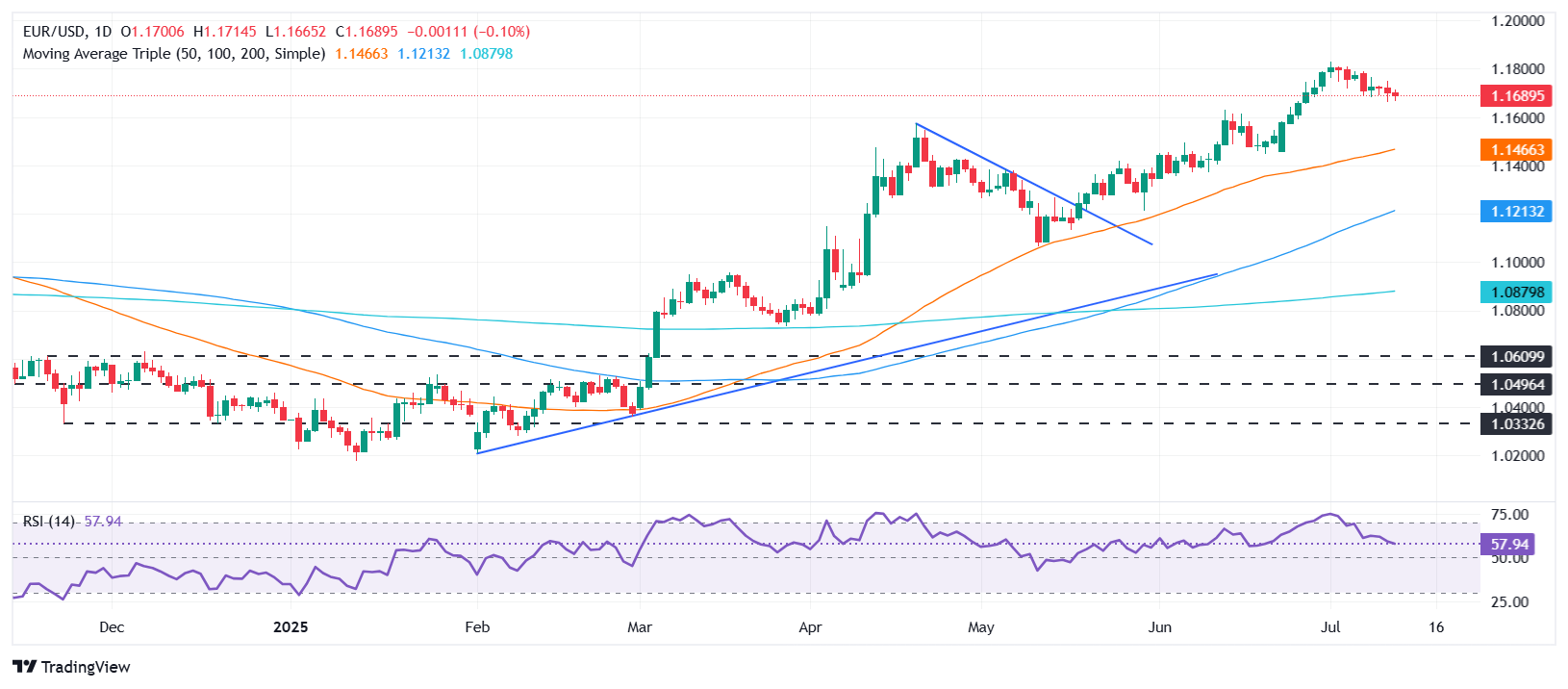- EUR/USD records its first weekly loss in three weeks, closing in 1,1688.
- Trump contemplates general tariffs, including the EU and copper exports.
- The dollar marks the strongest week since March in the midst of a wide tone of risk aversion.
The EUR/USD ended the week with losses of more than 0.70% and closed the Friday session with a 0.10% drop, quoting below the figure of 1,1700, consolidating the case for a setback that tests key support levels while the dollar records its best week in four months. At the time of writing, the par is quoted in 1,1688.
A feeling of risk aversion was triggered by the president of the United States, Donald Trump, who remains focused on expanding tariffs to countries, but also raw materials such as copper. News arose that he could impose general tariffs and that he has his eyes on a letter to the European Union (EU), which records his first weekly loss in the last three weeks.
A light economic agenda on both sides of the Atlantic presented appearances in the media of the Federal Reserve (FED) officials, together with wholesale prices data for June, revealed in Germany.
What moves the market today: euro pressed for Trump threats to send tariff letter to the EU
- The euro was defensive as the news reports revealed Trump’s intention to send a letter to the EU. In addition to this, it imposed 35% tariffs on Canada, and it is reported that it is considering general tariffs from 15% to 20%, pointing out an escalation of the commercial war.
- Chicago Fed President Austan Goolsbee (voter in 2025) said that the new tariffs complicates the revelation of true economic performance. He said that tariffs could delay feature cuts and want to wait until anxiety dissipates before feeling comfortable that the US is back on the way to a soft landing.
- On the other side of the Atlantic, the officials of the European Central Bank (ECB) revealed mixed positions on monetary policy. Schnabel was aggressive, stating that “the barrier for another rate cut is very high” and dismissing the need for more flexibility unless inflation deviates materially from the objective of 2% of the ECB in the medium term, something that currently does not see evidence.
- Fabio Panetta of the ECB was slightly moderate, pointing out that if the downward risks for growth intensify and reinforce the deflationary pressures, it may require greater monetary flexibility.
- Wholesale prices in Germany rose an intermensual 0.2% in June as expected, crushing the fall of -0.3% of May. Annually, prices jumped from 0.4% to 0.9% for the same period.
EURO TECHNICAL PERSPECTIVE: EUR/USD falls below 1,1700 while sellers point to 1,1500
The EUR/USD broke below the figure of 1,1700, however, it is maintained above the single mobile (SMA) of 20 days of 1,1662. Although he bounced to the current price levels, the torque that remains below 1,1700, paves the way for a greater decrease.
The first support would be the 20 -day SMA. Once surpassed, the next stop would be 1,1650, followed by the 50 -day SMA in 1,1464.

EURO – FREQUENT QUESTIONS
The euro is the currency of the 19 countries of the European Union that belong to the Eurozone. It is the second most negotiated currency in the world, behind the US dollar. In 2022, it represented 31 % of all foreign exchange transactions, with an average daily business volume of more than 2.2 billion dollars a day. The EUR/USD is the most negotiated currency pair in the world, with an estimate of 30 %of all transactions, followed by the EUR/JPY (4 %), the EUR/GBP (3 %) and the EUR/AU (2 %).
The European Central Bank (ECB), based in Frankfurt (Germany), is the Eurozone reserve bank. The ECB establishes interest rates and manages monetary policy. The main mandate of the ECB is to maintain price stability, which means controlling inflation or stimulating growth. Its main tool is the rise or decrease in interest rates. Relatively high interest rates (or the expectation of higher types) usually benefit the euro and vice versa. The GOVERNMENT BOOK of the ECB makes decisions about monetary policy in meetings that are held eight times a year. The decisions are made by the directors of the National Banks of the Eurozone and six permanent members, including the president of the ECB, Christine Lagarde.
Eurozone inflation data, measured by the harmonized consumer prices index (IPCA), are an important economic indicator for the euro. If inflation increases more than expected, especially if it exceeds 2% of the ECB, it forces the ECB to rise interest rates to control it again. Relatively high interest rates compared to their counterparts usually benefit the euro, since they make the region more attractive as a place for global investors to deposit their money.
Published data measure the health of the economy and can have an impact on the euro. Indicators such as GDP, manufacturing and services PMIs, employment and consumer trust surveys can influence the direction of the single currency. A strong economy is good for the euro. Not only attracts more foreign investment, but it can encourage the ECB to raise interest rates, which will directly strengthen the euro. Otherwise, if economic data is weak, the euro is likely to fall. The economic data of the four largest economies in the euro zone (Germany, France, Italy and Spain) are especially significant, since they represent 75% of the economy of the euro area.
Another important fact that is published on the euro is the commercial balance. This indicator measures the difference between what a country earns with its exports and what you spend on imports during a given period. If a country produces highly demanded export products, its currency will gain value simply by the additional demand created by foreign buyers seeking to buy those goods. Therefore, a positive net trade balance strengthens a currency and vice versa in the case of a negative balance
Source: Fx Street
I am Joshua Winder, a senior-level journalist and editor at World Stock Market. I specialize in covering news related to the stock market and economic trends. With more than 8 years of experience in this field, I have become an expert in financial reporting.







